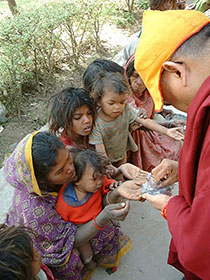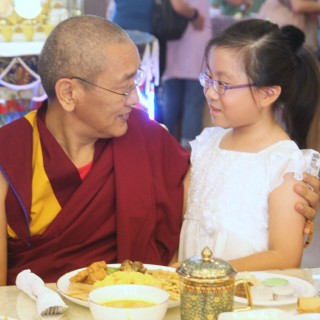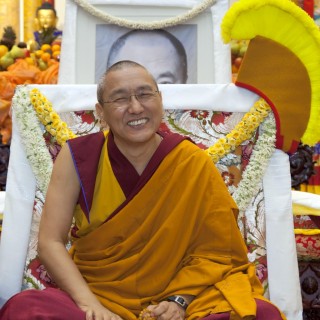- Home
- FPMT Homepage
Foundation for the Preservation of the Mahayana Tradition
The FPMT is an organization devoted to preserving and spreading Mahayana Buddhism worldwide by creating opportunities to listen, reflect, meditate, practice and actualize the unmistaken teachings of the Buddha and based on that experience spreading the Dharma to sentient beings. We provide integrated education through which people’s minds and hearts can be transformed into their highest potential for the benefit of others, inspired by an attitude of universal responsibility and service. We are committed to creating harmonious environments and helping all beings develop their full potential of infinite wisdom and compassion. Our organization is based on the Buddhist tradition of Lama Tsongkhapa of Tibet as taught to us by our founders Lama Thubten Yeshe and Lama Thubten Zopa Rinpoche.
- Willkommen
Die Stiftung zur Erhaltung der Mahayana Tradition (FPMT) ist eine Organisation, die sich weltweit für die Erhaltung und Verbreitung des Mahayana-Buddhismus einsetzt, indem sie Möglichkeiten schafft, den makellosen Lehren des Buddha zuzuhören, über sie zur reflektieren und zu meditieren und auf der Grundlage dieser Erfahrung das Dharma unter den Lebewesen zu verbreiten.
Wir bieten integrierte Schulungswege an, durch denen der Geist und das Herz der Menschen in ihr höchstes Potential verwandelt werden zum Wohl der anderen – inspiriert durch eine Haltung der universellen Verantwortung und dem Wunsch zu dienen. Wir haben uns verpflichtet, harmonische Umgebungen zu schaffen und allen Wesen zu helfen, ihr volles Potenzial unendlicher Weisheit und grenzenlosen Mitgefühls zu verwirklichen.
Unsere Organisation basiert auf der buddhistischen Tradition von Lama Tsongkhapa von Tibet, so wie sie uns von unseren Gründern Lama Thubten Yeshe und Lama Thubten Zopa Rinpoche gelehrt wird.
- Bienvenidos
La Fundación para la preservación de la tradición Mahayana (FPMT) es una organización que se dedica a preservar y difundir el budismo Mahayana en todo el mundo, creando oportunidades para escuchar, reflexionar, meditar, practicar y actualizar las enseñanzas inconfundibles de Buda y en base a esa experiencia difundir el Dharma a los seres.
Proporcionamos una educación integrada a través de la cual las mentes y los corazones de las personas se pueden transformar en su mayor potencial para el beneficio de los demás, inspirados por una actitud de responsabilidad y servicio universales. Estamos comprometidos a crear ambientes armoniosos y ayudar a todos los seres a desarrollar todo su potencial de infinita sabiduría y compasión.
Nuestra organización se basa en la tradición budista de Lama Tsongkhapa del Tíbet como nos lo enseñaron nuestros fundadores Lama Thubten Yeshe y Lama Zopa Rinpoche.
A continuación puede ver una lista de los centros y sus páginas web en su lengua preferida.
- Bienvenue
L’organisation de la FPMT a pour vocation la préservation et la diffusion du bouddhisme du mahayana dans le monde entier. Elle offre l’opportunité d’écouter, de réfléchir, de méditer, de pratiquer et de réaliser les enseignements excellents du Bouddha, pour ensuite transmettre le Dharma à tous les êtres. Nous proposons une formation intégrée grâce à laquelle le cœur et l’esprit de chacun peuvent accomplir leur potentiel le plus élevé pour le bien d’autrui, inspirés par le sens du service et une responsabilité universelle. Nous nous engageons à créer un environnement harmonieux et à aider tous les êtres à épanouir leur potentiel illimité de compassion et de sagesse. Notre organisation s’appuie sur la tradition guéloukpa de Lama Tsongkhapa du Tibet, telle qu’elle a été enseignée par nos fondateurs Lama Thoubtèn Yéshé et Lama Zopa Rinpoché.
Visitez le site de notre Editions Mahayana pour les traductions, conseils et nouvelles du Bureau international en français.
Voici une liste de centres et de leurs sites dans votre langue préférée
- Benvenuto
L’FPMT è un organizzazione il cui scopo è preservare e diffondere il Buddhismo Mahayana nel mondo, creando occasioni di ascolto, riflessione, meditazione e pratica dei perfetti insegnamenti del Buddha, al fine di attualizzare e diffondere il Dharma fra tutti gli esseri senzienti.
Offriamo un’educazione integrata, che può trasformare la mente e i cuori delle persone nel loro massimo potenziale, per il beneficio di tutti gli esseri, ispirati da un’attitudine di responsabilità universale e di servizio.
Il nostro obiettivo è quello di creare contesti armoniosi e aiutare tutti gli esseri a sviluppare in modo completo le proprie potenzialità di infinita saggezza e compassione.
La nostra organizzazione si basa sulla tradizione buddhista di Lama Tsongkhapa del Tibet, così come ci è stata insegnata dai nostri fondatori Lama Thubten Yeshe e Lama Zopa Rinpoche.
Di seguito potete trovare un elenco dei centri e dei loro siti nella lingua da voi prescelta.
- 欢迎 / 歡迎
简体中文
“护持大乘法脉基金会”( 英文简称:FPMT。全名:Foundation for the Preservation of the Mahayana Tradition) 是一个致力于护持和弘扬大乘佛法的国际佛教组织。我们提供听闻,思维,禅修,修行和实证佛陀无误教法的机会,以便让一切众生都能够享受佛法的指引和滋润。
我们全力创造和谐融洽的环境, 为人们提供解行并重的完整佛法教育,以便启发内在的环宇悲心及责任心,并开发内心所蕴藏的巨大潜能 — 无限的智慧与悲心 — 以便利益和服务一切有情。
FPMT的创办人是图腾耶喜喇嘛和喇嘛梭巴仁波切。我们所修习的是由两位上师所教导的,西藏喀巴大师的佛法传承。
繁體中文
護持大乘法脈基金會”( 英文簡稱:FPMT。全名:Found
ation for the Preservation of the Mahayana Tradition ) 是一個致力於護持和弘揚大乘佛法的國際佛教組織。我們提供聽聞, 思維,禪修,修行和實證佛陀無誤教法的機會,以便讓一切眾生都能 夠享受佛法的指引和滋潤。 我們全力創造和諧融洽的環境,
為人們提供解行並重的完整佛法教育,以便啟發內在的環宇悲心及責 任心,並開發內心所蘊藏的巨大潛能 — 無限的智慧與悲心 – – 以便利益和服務一切有情。 FPMT的創辦人是圖騰耶喜喇嘛和喇嘛梭巴仁波切。
我們所修習的是由兩位上師所教導的,西藏喀巴大師的佛法傳承。 察看道场信息:
- FPMT Homepage
- News/Media
-
- Study & Practice
-
-
- About FPMT Education Services
- Latest News
- Programs
- New to Buddhism?
- Buddhist Mind Science: Activating Your Potential
- Heart Advice for Death and Dying
- Discovering Buddhism
- Living in the Path
- Exploring Buddhism
- FPMT Basic Program
- FPMT Masters Program
- FPMT In-Depth Meditation Training
- Maitripa College
- Lotsawa Rinchen Zangpo Translator Program
- Universal Education for Compassion & Wisdom
- Online Learning Center
-
- Prayers & Practice Materials
- Overview of Prayers & Practices
- Full Catalogue of Prayers & Practice Materials
- Explore Popular Topics
- Benefiting Animals
- Chenrezig Resources
- Death & Dying Resources
- Lama Chopa (Guru Puja)
- Lama Zopa Rinpoche: Compendium of Precious Instructions
- Lama Zopa Rinpoche: Life Practice Advice
- Lama Zopa Rinpoche Practice Series
- Lamrim Resources
- Mantras
- Prayer Book Updates
- Purification Practices
- Sutras
- Thought Transformation (Lojong)
- Audio Materials
- Dharma Dates - Tibetan Calendar
- Translation Services
- Publishing Services
- Ways to Offer Support
- Prayers & Practice Materials
-
- Teachings and Advice
- Find Teachings and Advice
- Lama Zopa Rinpoche Advice Page
- Lama Zopa Rinpoche: Compendium of Precious Instructions
- Lama Zopa Rinpoche Video Teachings
- ༧སྐྱབས་རྗེ་བཟོད་པ་རིན་པོ་ཆེ་མཆོག་ནས་སྩལ་བའི་བཀའ་སློབ་བརྙན་འཕྲིན།
- Podcasts
- Lama Yeshe Wisdom Archive
- Buddhism FAQ
- Dharma for Young People
- Resources on Holy Objects
- Teachings and Advice
-
-
*If a menu item has a submenu clicking once will expand the menu clicking twice will open the page.
-
-
- Centers
-
- Teachers
-
- Projects
-
-
-
-
*If a menu item has a submenu clicking once will expand the menu clicking twice will open the page.
-
-
- FPMT
-
-
-
-
-
Basically, the human mind is mostly unconscious, ignorant, and gets so preoccupied with new experiences, that it forgets the old ones. Review the past month: exactly what happened, precisely what feelings did you have, every day? You can’t remember, can you? But if you practice this slowly, slowly, continuously checking within your mind, eventually, you’ll be able to remember more and more of your previous experiences.
Share
Lama Thubten Yeshe
-
-
-
- Shop
-
-
-
The Foundation Store is FPMT’s online shop and features a vast selection of Buddhist study and practice materials written or recommended by our lineage gurus. These items include homestudy programs, prayers and practices in PDF or eBook format, materials for children, and other resources to support practitioners.
Items displayed in the shop are made available for Dharma practice and educational purposes, and never for the purpose of profiting from their sale. Please read FPMT Foundation Store Policy Regarding Dharma Items for more information.
-
-
25
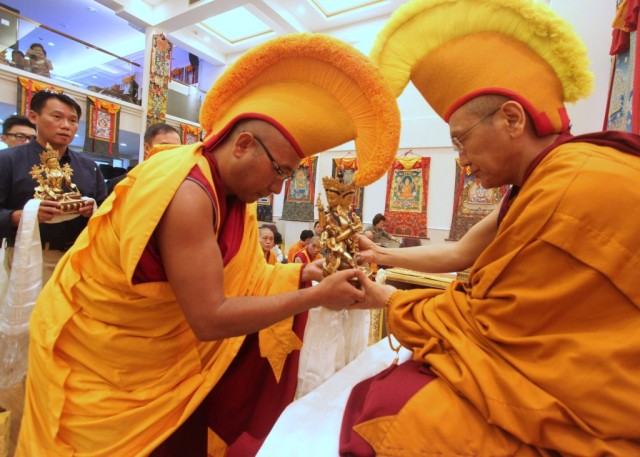
Khen Rinpoche Geshe Chonyi receiving offering from Geshe Sherab at long life puja, Amitabha Buddhist Centre, Singapore, July 2013. All photos by Tan Seow Kheng; courtesy of ABC.
By Ven. Tenzin Tsultrim
In July 2013, Khen Rinpoche Geshe Chonyi accepted his first long life puja in the presence of some 200 students and well-wishers at Amitabha Buddhist Centre (ABC) in Singapore. Khen Rinpoche, who is ABC’s resident teacher as well as the abbot of Kopan Monastery and Nunnery, said he enjoyed receiving the puja, which was organized to celebrate his 51st birthday.
For 10 years, Khen Rinpoche joked, he was used to being the one making the offerings during the long life ceremonies for Lama Zopa Rinpoche and Khensur Rinpoche Lama Lhundrup. This time, the ritual master was Geshe Thubten Sherab, who had accepted the invitation to travel from Kopan Monastery for the occasion. The puja itself was led by the chanting master of Kopan Monastery, Geshe Lobsang Sherab. The resident teachers and directors of the three FPMT centers in Malaysia also made a special trip to Singapore to be part of the celebration.
Khen Rinpoche spoke before the puja on how to make the practice meaningful:
We all know what Lama Zopa Rinpoche has mentioned before about the long life puja. Mainly when we offer long life puja to the gurus, we have a Dharma connection with them. From your heart, when you make strong requests for the gurus to live long, that helps the guru to live long. The whole point why you are requesting is because you see some benefit for the guru to live long. If you can see from your heart why the guru needs to live long, then make single-pointed request to the gurus. When you request the guru to live long, at the same time you yourself have long life. That is the benefit. Both of you [guru and disciple] get the benefit.
When you do the long life puja, it is mainly the practice of Guru Puja. Remember to visualize or think that your own guru is in front of you. It doesn’t have to be me. Those who have a close Dharma connection with your own gurus, you can visualize them. Then you make these extensive offerings to the guru from your heart, and make strong requests for the guru to live long.
Make sure, as you are doing the Guru Puja, to make it meaningful for yourself. When you do it well, that means you are closer to the gurus. That means you are closer to enlightenment, closer to the Buddha, closer to the Dharma, closer to the Sangha. Make sure you do that. I think it is extremely important.
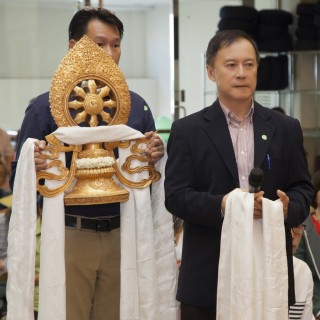
ABC vice-president Fred Cheong and director Tan Hup Cheng presenting Dharma wheel, Singapore, July 2013
Among the procession of offerings presented to Khen Rinpoche was an impressively large Dharma wheel, a gift from the center and the second batch of Basic Program students whom Khen Rinpoche has taught for the past two years. Representing the center and the students, ABC’s director Tan Hup Cheng and vice-president Fred Cheong presented the gigantic wheel to Khen Rinpoche together with a strong request that he would continue to teach at ABC for a very long time.
Besides the Basic Program, Khen Rinpoche teaches a weekly lam-rim class that is translated for Chinese speakers, and a monthly “Dharma for Seniors” class. Khen Rinpoche has also formed a bond with some of the youngest members of ABC, including ten-year-old Melody Wee, who offered a song. Her mature and captivating rendition of “If We Hold on Together” held all the grown-ups in misty-eyed rapture.
At the end of the puja, Khen Rinpoche offered an insight into his life and why he has continued to stay as ABC’s resident teacher:
I was born in 1962. I spent 12 years with my family. After that I spent six years in Kopan Monastery, then I spent another 18 to 19 years in South India, then I spent 14 years in Singapore.
When I look back at myself, how I became a monk is because I met Lama Yeshe, the first time when I was aged 12, in 1974. Lama Yeshe came all the way to my hometown and I met him there. Because of that I was able to become a monk, to be ordained. After I became ordained I spent six years at Kopan. I was able to stay as a monk because of the late ex-abbot Lama Lhundrup. When I was 15 to 17 years old, my mind was always wandering. It was not an easy time, under different conditions. Because of his advice, I was able to remain as a monk at that time. After that I moved to South India. I had all this education [at Sera Je Monastery]. All this depended one hundred per cent on my teacher [Khensur Rinpoche Lobsang Tsering, ex-abbot of Sera Je Monastery]. Because of his kindness, I was able to complete my studies at the level of geshe. After that, I came to Singapore.
Being able to live here for 14 years is all from depending on Lama Zopa Rinpoche’s advice. I mentioned before, when I came for the first time to Singapore, I thought I would stay just one year. I told my friends, everybody, I would try for one year. After one year I will be back, I said! Somehow I have stayed until now, because of Rinpoche’s advice.
Why I have stayed here so long is because of the members and students of Amitabha Buddhist Centre, because they all have some interest to learn Buddhadharma. That is the main thing that has made me stay here, so far, because I see that people have interest, put in effort. Some of them really, for 14 years they are here with me, without missing class, twice a week. When I see their lives, how busy they are. They have to work from morning to night. Also, they have families, have to go out with the family, need time for the family, but still they put in so much effort and come to class. So really, that really makes me stay in Singapore, here, to teach. That is the main reason. How long I stay here all depends on that. Entirely depends on that.
In keeping with the occasion of celebrating Khen Rinpoche’s birthday, there was a festive mood to the puja. And true to Singapore’s culture, the celebration was made complete with hearty eating, a Thai-style lunch buffet treat for everyone from ABC’s Executive Committee, who requested Khen Rinpoche to accept the long life puja and who also organized it.
Mandala brings you news of Lama Zopa Rinpoche and of activities, teachings and events from over 160 FPMT centers, projects and services around the globe. If you have news you would like to share, please let us know.
- Home
- News/Media
- Study & Practice
- About FPMT Education Services
- Latest News
- Programs
- New to Buddhism?
- Buddhist Mind Science: Activating Your Potential
- Heart Advice for Death and Dying
- Discovering Buddhism
- Living in the Path
- Exploring Buddhism
- FPMT Basic Program
- FPMT Masters Program
- FPMT In-Depth Meditation Training
- Maitripa College
- Lotsawa Rinchen Zangpo Translator Program
- Universal Education for Compassion & Wisdom
- Online Learning Center
- Prayers & Practice Materials
- Overview of Prayers & Practices
- Full Catalogue of Prayers & Practice Materials
- Explore Popular Topics
- Benefiting Animals
- Chenrezig Resources
- Death & Dying Resources
- Lama Chopa (Guru Puja)
- Lama Zopa Rinpoche: Compendium of Precious Instructions
- Lama Zopa Rinpoche: Life Practice Advice
- Lama Zopa Rinpoche Practice Series
- Lamrim Resources
- Mantras
- Prayer Book Updates
- Purification Practices
- Sutras
- Thought Transformation (Lojong)
- Audio Materials
- Dharma Dates – Tibetan Calendar
- Translation Services
- Publishing Services
- Teachings and Advice
- Find Teachings and Advice
- Lama Zopa Rinpoche Advice Page
- Lama Zopa Rinpoche: Compendium of Precious Instructions
- Lama Zopa Rinpoche Video Teachings
- ༧སྐྱབས་རྗེ་བཟོད་པ་རིན་པོ་ཆེ་མཆོག་ནས་སྩལ་བའི་བཀའ་སློབ་བརྙན་འཕྲིན།
- Podcasts
- Lama Yeshe Wisdom Archive
- Buddhism FAQ
- Dharma for Young People
- Resources on Holy Objects
- Ways to Offer Support
- Centers
- Affiliates Area
- Teachers
- Projects
- Charitable Projects
- Make a Donation
- Applying for Grants
- News about Projects
- Other Projects within FPMT
- Support International Office
- Projects Photo Galleries
- Give Where Most Needed
- FPMT
- Shop
Subscribe to FPMT News
Translate*
*powered by Google TranslateTranslation of pages on fpmt.org is performed by Google Translate, a third party service which FPMT has no control over. The service provides automated computer translations that are only an approximation of the websites' original content. The translations should not be considered exact and only used as a rough guide.Be wise. Treat yourself, your mind, sympathetically, with loving kindness. If you are gentle with yourself, you will become gentle with others.







